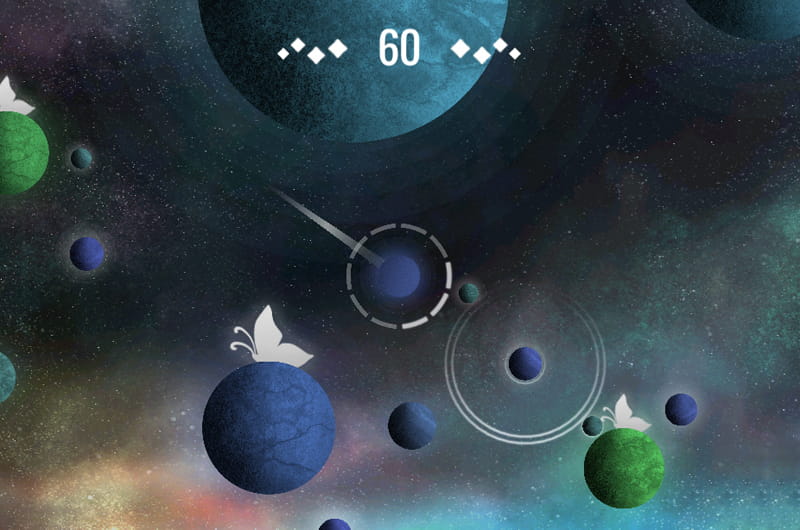Reaching for the Stars in the Entrepreneurial Game Studio
 By Frank Otto
By Frank Otto
Bugs are the bane of video game programmers’ existence.
The biggest video game titles employ entire teams to work thousands of hours to root out problems in their games before (and sometimes after) they reach the market.
But for a team of Drexel students in the Entrepreneurial Game Studio, a bug became the mother of invention for their game based on slingshotting planets around the galaxy.
“The original idea for our orbiting mechanic came from a bug with a prototype for another game. When you jumped, you could miss landing back on the ground and, instead, gravity would slingshot you around the planet,” said Gabby Getz, the lead of Lunar Rabbit, the team behind the game Starbright. “We found this to be more fun than the game we were prototyping.”
So Starbright was born. A touchscreen-based game, the player guides a planet through the universe, using the gravity of a larger celestial objects to smack into smaller planets and grow in size.
The team behind Starbright consists of three students from Drexel: Gabby Getz, Laura Mo (a developer) and Amy Su (an artist), plus Justin Niosi, a former Drexel student. Additionally, student Alex Olivares provided the game’s original music.
“They’re extraordinarily talented students who have proven their dedication to game development,” said Frank Lee, PhD, the founder and director of the Entrepreneurial Game Studio. “Gabby, Laura and Justin shared programming and design responsibilities and have created a well-designed, procedurally generated game that is very responsive. Amy’s art style unifies the game world and offers a sense of whimsy and wonder as you progress.”
The team took inspiration from other parts of the game and art world to create the game, which they hope encourages “meditation.”
Su created the game’s “flattened, textured” and colorful look by drawing upon space images created by artist Heather Penn. Mo looks up to Shigeru Miyamoto, the creator of franchises like Super Mario Bros. and the Legend of Zelda because of his “adherence to gameplay first and foremost.”
With three quarters of their team made up of women, Lunar Rabbit is in an industry that has recently received media coverage involving poor treatment of women.
Lee is “deeply proud” to lend a hand in Lunar Rabbit’s success.
“In founding the Entrepreneurial Game Studio, I hoped to support more young women in their journeys to creating and publishing games,” Lee said. “I hope that Lunar Rabbit is the first of many women-founded game companies coming out of the Entrepreneurial Game Studio.”

Some members of Lunar Rabbit are wary of the industry, but they’re keeping some optimism intact.
Mo brought up an example from 2014 in which Ubisoft, a prominent video game company, received some heat for abandoning women characters in its flagship franchise Assassin’s Creed, explaining that it would be too much extra work.
She feels the controversy following proved that there is a desire for more women and women characters in gaming.
“There’s definitely progress,” Mo said.
But those women characters can’t just be “tokens,” either.
“It’s great that there’s women in games, but they can’t always be characterized the same way or play the same role,” Mo said. “That’s just not satisfying. I think the next step is to realize women make up half the population and have diverse views and abilities.”
Su said she’s not worried about any of those issues.
“I’ve never had any concerns about being a woman in the industry,” she said. “Everyone at Drexel has been very welcoming and supportive. I think most people in this field are just concerned about getting a job, in general.”
Toward that, the Lunar Rabbit team is well on their way.
Starbright has been on the Google Play marketplace for some time and was just released for iOS.
After completely scrapping their original game of everything except a control mechanic, the setting and the title, Getz said it’s “incredibly rewarding” to see their game on the market.
Mo echoed her thoughts.
“There were definitely times during the production of the game that felt like it would never be finished,” Mo said. “So finally being able to ship it out knowing that you managed to see something through to the end is very satisfying.”
In This Article
Drexel News is produced by
University Marketing and Communications.
